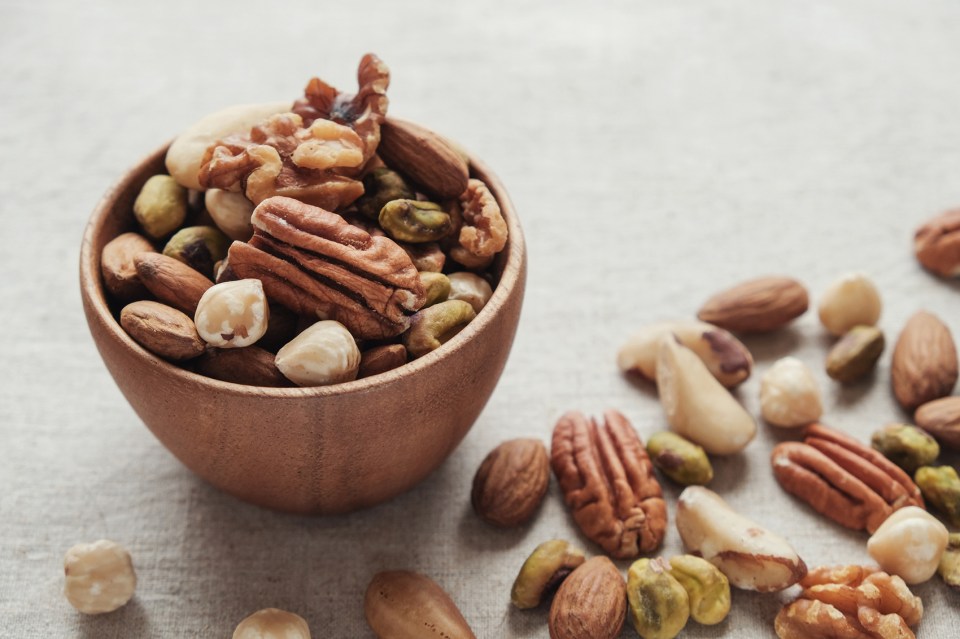It’s 3 p.m. when the hunger sets in. Your stomach grumbles at peak volume within full-circle earshot. Quickly, you reveal a stash of nuts, fumbling to open the bag for a peek inside. The nutty aroma fills the air as you reach in to grab a handful. But, just as you pop one into your mouth, that inner voice stops you in your path.
“Is this good for me?”
We can answer that. Yes! Just don’t go totally nuts.
Harvested within southern tree-lined fields, bush farms or Amazon rain forests, nuts continue to be a go-to for snacks and recipes. Still, many people avoid them altogether due to higher fat and calories. The fact is, nuts are actually associated with less weight gain, improved wellness and heart-healthy benefits when consumed in serving-size portions.
Packed with protein, fiber, vitamins, minerals and antioxidants, nuts have been noted to improve blood sugar control, blood pressure, metabolism of fats, inflammation and blood vessel wall function. In one study, people with type 2 diabetes who ate five servings of nuts per week enjoyed a 17% lower risk of cardiovascular disease. Even a small amount of nuts made a difference, with a 3% lower risk of cardiovascular disease for each additional weekly serving.
Adding Nuts to Your Daily Nutrition is Easy
Pair them with carbohydrates or juice to help slow down digestion and the breakdown of sugar. Sprinkle nuts on salads for added crunch. Choose nut butters to spread on fruit slices or add them to smoothies. You can even drink nuts in milk form.
Which Nuts Should You Choose?
Check out these six great choices to make your heart happy.
Almond
On the lower end of the calorie scale, almonds are a protein-rich option to fight off hunger in lieu of salty pretzels or chips. Loaded with vitamins and minerals, including calcium and iron, its antioxidants help fight dangerous inflammation, making it a heart healthy contender for nut of the year.
Pecan
Popularized for its pecan pie perfection, these high-fiber kernels are one of the best-known dietary sources of vitamin E for antioxidant benefits. The pecan’s healthy fats and fiber help lower cholesterol, while its oleic acids support the immune system, potentially reducing risk for heart disease or stroke.
Pistachio
Plucked from the seed of the pistachio tree, this culinary nut packs a powerful punch to heart-related health issues, which includes a big dose of potassium to support blood pressure and control electrical activities of the heart. Pistachios are great for weight management too, delivering protein via a satisfying 49 nuts per serving. Even better, shelling them one by one curtails overeating, allowing the brain a chance to process fullness.
Brazil Nut
Grown in the Amazon rain forest, The Brazil nut isn’t really such a hard nut to crack. Used in Thai dishes, trail mixes and pesto, Brazil nuts are one of the highest-known food sources of selenium, a mineral that has been associated with stabilizing glucose and insulin responses. That’s great news for diabetics, who are prone to heart disease.
Walnut
Awarded lowest in sugar for the nut family, walnuts are celebrating their more recent celebrity status for heart health. Walnuts contain high levels of alpha linolenic acid, which is suggested to help heart arrhythmias. It’s even been suggested that walnuts are as effective as olive oil in reducing inflammation and oxidation in the arteries following a fatty meal. No doubt – walnuts are yet another smart choice for weight management and cholesterol control.
Peanut
While technically a legume in real life, peanuts play a large role in maintaining a healthy heart. Peanuts yield lots of magnesium to keep the heart muscle strong. They’re also low in cholesterol and boost high levels of protein to curb cravings. Plus, peanuts are a more affordable and readily abundant option, keeping excuses at bay for healthier eating.
Hazelnut
Saving the sweetest for last, hazelnuts are a favorite for sweet and salty treats alike. But, don’t let that fool you. Hazelnuts are dynamite at lowering bad cholesterol and offer anti-inflammatory properties for heart health. The skin of a hazelnut is rich in antioxidants, so be sure to select unroasted kernels with skin intact to give the most benefit to your heart.
Try This Nutty Recipe
Try this nutty and heart-healthy recipe from the American Heart Association (AHA).
Acorn Squash Wedges with Walnuts
Available in the AHA Healthy Slow Cooker Cookbook, 2nd Edition
Servings 4, Serving size 1 squash wedge, 2 tablespoons sauce
Per serving: 150 calories, 2g protein, 3g fiber
Ingredients
Cooking spray
1 teaspoon canola oil or corn oil
1 medium diced onion
¼ cup water
2 tablespoons chopped walnuts
¾ teaspoon cinnamon
¼ teaspoon ground nutmeg
1 large acorn squash (about 1 ½ pounds), seeds and strings discarded, cut into 4 wedges
1 tablespoon plus 1 teaspoon firmly packed dark brown sugar
1 tablespoon light tub margarine
1 teaspoon vanilla extract
1/8 teaspoon salt
2 teaspoons canola or corn oil
Directions
Lightly spray the slow cooker with cooking spray. Set aside.
In a large nonstick skillet, heat 1 teaspoon oil over medium-high heat, swirling to coat the bottom. Cook the onion for 3 to 4 minutes or until beginning to light brown, stirring frequently. Transfer to the slow cooker.
Stir in the water, walnuts, cinnamon and nutmeg.
Arrange each squash wedge with a cut side down on top of the onion mixture, making sure that a cut side of each squash wedge touches the onion mixture. Cook, covered, on low for 4 hours or on high for 2 hours, or until the squash is tender when pierced with a fork.
Place the squash wedges on plates. Stir the remaining ingredients into the onion mixture. Spoon over the squash.
Resources:
heart.org/en/healthy-living/healthy-eating/eat-smart/fats/go-nuts-but-just-a-little
American Heart Association Meeting Reports – Presentation 284, Session: LF.AOS.01 and Presentation Sa1297, Session LF.APS.02
newsroom.heart.org, Circulation Research Journal Report, Published February 19, 2019
medicalnewstoday.com/articles/323042.php
health.com/health/gallery/020585485,00.html, Amanda MacMillan, September 18, 2019
The content of this site is for informational purposes only and should not be taken as professional medical advice. Always seek the advice of your physician or other qualified healthcare provider with any questions you may have regarding any medical conditions or treatments.



